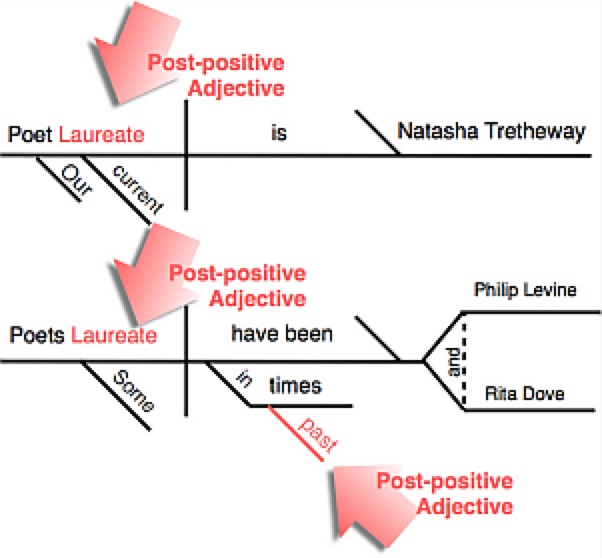
Karl J Sherlock
Associate Professor, English
Email: karl.sherlock@gcccd.edu
Phone: 619-644-7871

Words that express the positive, the comparative (-er, more),and the superlative (-est, most) are adjectives.
Placing the positive form of an adjective after the noun it modifies is rarely done in English except when you want to achieve an elevated style. In many instances, this technique creates a compound word, sometimes hyphenated (as with the word "a" in front of it):
Most of the time, though, it's a simple matter of putting the separate descriptor right after the noun it modifies. The following list is far from comprehensive, but it contains some common examples of post-positive adjectives found in English. The post-positive adjective in each phrase has been underlined:
Some noun forms are more prone to post-positive adjectives than others, because they express an added element of power, dominance, or supremacy. Probably the most common occurrence of this is in the phrase "best [noun] possible," though, in advertising you quite often hear "best [noun] available" just as frequently. This is basically a literal translation of the French adjective "deluxe," and quite often you'll see product names that have the word "deluxe" in them to create this elite effect. Advertisers are prone to hyperbole, but you can substitute "best" and the post-positive adjective with superlatives and adjectives ("the lowest prices imaginable," for instance.) The same elite attitude advertisers try to encourage is expressed in traditional arenas of power and class, especially if it involves lineage or political and military positions.
(the position of the creature or animal on the crest):
(surnames)
Family names are, on rare occasions, presented as post-positive adjectives after common nouns. What makes these different from any titles of respect ("Professor Sherlock," for example) is that the definite article "the" comes before them:
Restaurant menus are a good place to find post-positive adjectives, because they give food dishes an air of lux cuisine:
Placing a post-positive adjective on a sentence diagram really depends on whether the adjective is part of a compound word, or whether it's just another modifier used with inverted word order. Consider the following two sentences:

"Poet Laureate" is not only a compound word, it's one of those irregularly pluralized compound nouns in which the "-s" stays with "Poets." Because it's treated as a single concept, the modifier "Laureate" remains with it as part of the noun. In the prepositional phrase, "in times past," however, "past" pretty much retains its character as a modifier.
This sort of distinction, though, splits hairs, and few would quibble with you if you decided to put "times past" on the horizontal line as one concept.
Karl J Sherlock
Associate Professor, English
Email: karl.sherlock@gcccd.edu
Phone: 619-644-7871

8800 Grossmont College Drive
El Cajon, California 92020
619-644-7000
Accessibility
Social Media Accounts